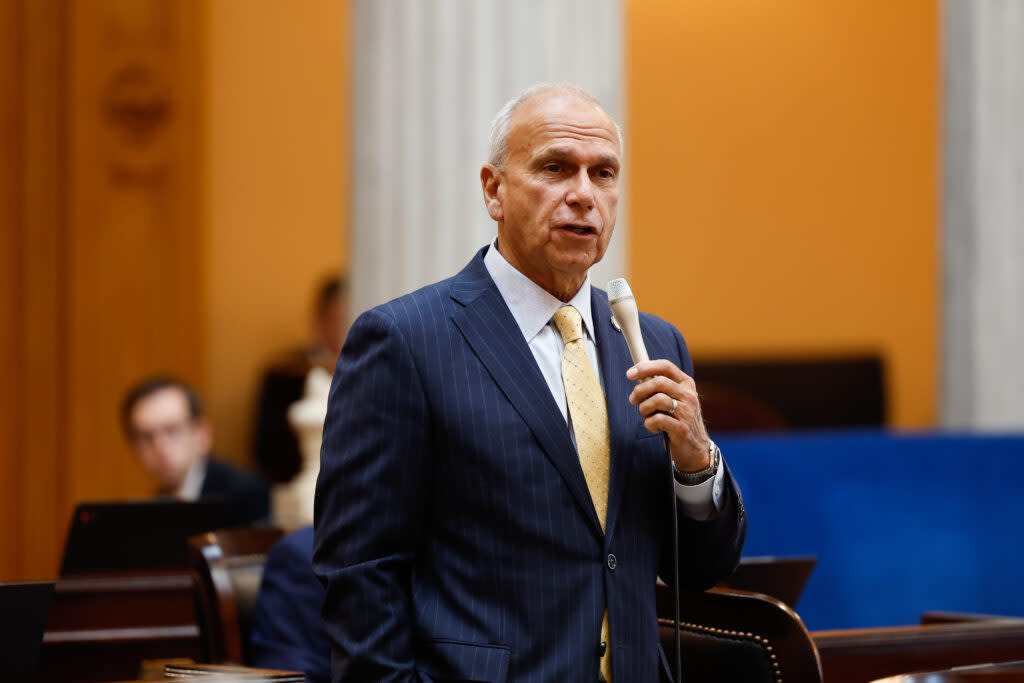Sponsor of controversial higher ed bill doesn’t want to discuss it with Ohio House Speaker

COLUMBUS, Ohio — JUNE 15: State Sen. Jerry Cirino, R-Kirtland, speaks during the Ohio Senate session, June 15, 2023, at the Statehouse in Columbus, Ohio. (Photo by Graham Stokes for Ohio Capital Journal)
The Republican lawmaker behind a massive higher education bill is not interested in meeting with House Speaker Jason Stephens about his bill, saying there’s “no purpose in wasting that time.”
Senate Bill 83 has seen no movement since it passed in the House Higher Education Committee a couple weeks before Christmas. The House had their final session before adjourning for summer break on Wednesday, but the bill was not on the agenda nor was it brought to the floor as an amendment.
“I was disappointed that (SB 83) was not included (in the House agenda),” Sen. Jerry Cirino, R-Kirtland, said during a press conference Wednesday.
He said he heard from a “credible third party” that Stephens wants to meet with Cirino over the summer to discuss the bill, but Cirino said he is not interested. He did not say who this person was, but did clarify that it was not a lawmaker.
“I just don’t think it would be productive quite frankly,” Cirino said. “I value my time and the time of my staff and we have other things to work on. And I think we’re just going to let this sit and ruminate for a little bit and take it up at the right time again. … I would be negotiating with myself because we have already made a number of concessions in the last 12 months to get support in the House.”
S.B. 83 has already gone through nearly a dozen revisions.
Cirino said he already had an hour-long meeting with Stephens back in December to go over the details of the bill and has sent Stephens 13 text messages related to S.B. 83 between December and April, but never received a response.
“I have not received word that there were some particular issues in the bill that the speaker was unhappy with, nothing came to me at all,” Cirino said. “Absolutely zero input. Ohio needs higher education reform and the time to display leadership in the House on this bill has come and gone.”
What’s in S.B. 83?
S.B. 83 was introduced last spring and it quickly passed in the Senate about two months after being introduced last year.
It would ban mandatory diversity, equity and inclusion training unless it is required to comply with state and federal law, professional licensure requirements or receiving accreditation or grants.
A retrenchment provision would prevent unions from negotiating on tenure and universities could fire tenured professors for a broad list of reasons including reduction in student population. However, faculty with 30-35 years of tenure would be protected.
S.B. 83 defines controversial beliefs or policy as “any belief or policy that is the subject of political controversy, including issues such as climate policies, electoral politics, foreign policy, diversity, equity, and inclusion programs, immigration policy, marriage, or abortion.”
The bill would allow students to “reach their own conclusions about all controversial beliefs or policies and shall not seek to indoctrinate any social, political or religious point of view.”
Cirino acknowledged his bill would likely pass if the provisions related to bargaining were removed, but he said that’s a critical piece of the bill.
“That’s like saying if you take the heart out of the patient, the patient will be fine,” he said. “It becomes a much less important bill.”
What happens next with S.B. 83?
Cirino said he wants to wait for a “more favorable environment in the House” — such as having Senate President Matt Huffman become the next Speaker of the House — before bringing S.B. 83 back up for discussion.
Cirino said he has heard there are enough House votes to pass his bill. If S.B. 83 is not passed through lame duck at the end of the General Assembly, Cirino said he would re-introduce the bill next year.
“If it comes up in lame duck, it will likely be the bill as it is today,” he said. “If it starts fresh in the new (General Assembly), then all bets are off, and the bill will look different than it does today.”
An anti-striking provision was taken out of S.B. 83, but Cirino said he’s thinking about potentially putting it back in the bill if he were to re-introduce it next year.
“I’m working on strategies and options that we have for it if we have to go into the next General Assembly,” Cirino said.
Gov. Mike DeWine recently said he would sign S.B. 83 if it underwent some more revisions, but didn’t elaborate on what changes he wanted to see.
When asked about this, Cirino said he has had a conversation with DeWine in addition to conversations with DeWine’s staff about some of their concerns with the bill — particularly regarding the length of university board of trustee terms. An amendment to S.B. 83 last year would reduce trustee terms from nine years down to four if the bill passed.
“I think that comment was made without realizing that the changes that they had requested late last year had already been incorporated into the bill,” Cirino said. “…The word I got from the governor’s office is that they are satisfied with the bill as it is today.”
Follow OCJ Reporter Megan Henry on X.
GET THE MORNING HEADLINES DELIVERED TO YOUR INBOX SUPPORT NEWS YOU TRUST.
The post Sponsor of controversial higher ed bill doesn’t want to discuss it with Ohio House Speaker appeared first on Ohio Capital Journal.


